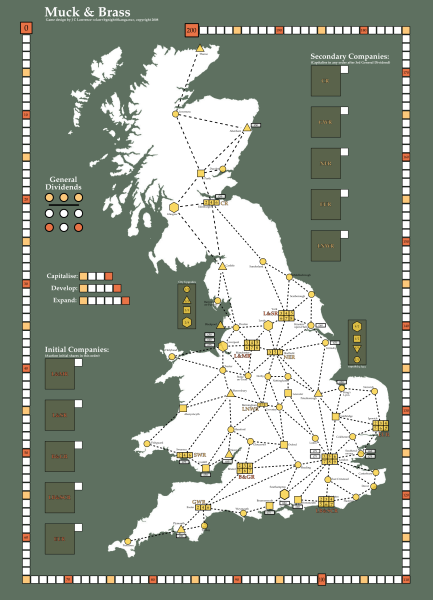Getting paid by the nose
I ran some thought models last night. They didn’t work so well. Today’s talk with Tim on #bgdf_chat summarises well enough:
[2008-08-29/12:51] <clearclaw> The Neuland action system has problems as described – it forces all players to ally equally.
[2008-08-29/12:51] <gamesonthebrain> How so?
[2008-08-29/12:52] <clearclaw> You want to make money on every player’s turn when they cross the boundary. Thus you want to invest in everything they hold a plurality in.
[2008-08-29/12:52] <clearclaw> Similarly you only want to forward companies you at least hold an equal share in.
[2008-08-29/12:53] <clearclaw> But that’s due to the definition of when/how dividends get paid.
[2008-08-29/12:53] <gamesonthebrain> Right, which can be changed
[2008-08-29/12:53] <clearclaw> Yep. Changing that constraint can change everything.
[2008-08-29/12:54] <clearclaw> I’m toying with having everything the player is invested in pays out, just to that player.
[2008-08-29/12:54] <gamesonthebrain> I did’t realize until today that Neuland’s turn order system is fairly different from Thebes
[2008-08-29/12:54] <clearclaw> That does really interesting things to the incentives.
[2008-08-29/12:54] <clearclaw> I’ve never played Thebes so can’t comment.
[2008-08-29/12:54] <clearclaw> Neuland is a favourite though.
[2008-08-29/12:54] <gamesonthebrain> In Thebes, the person in the back of the line always takes the next action
[2008-08-29/12:55] <gamesonthebrain> So the actions would be much more broken up
[2008-08-29/12:55] <gamesonthebrain> If I was on space 4 and you on 3, it would be your turn
[2008-08-29/12:55] <clearclaw> Ditto Neuland except that in Neuland players get to keep using actions until they quit, as long as they don’t pass themselves.
[2008-08-29/12:55] * clearclaw nods.
[2008-08-29/12:55] <clearclaw> That is finer grained.
[2008-08-29/12:55] <gamesonthebrain> If you took a 1 AP point action, you’d then be on “top” of me, and thus still your turn
[2008-08-29/12:55] <gamesonthebrain> Ya
[2008-08-29/12:55] <clearclaw> I’m thinking of that graining for this game.
[2008-08-29/12:56] <clearclaw> Tinner’s Trail is somewhat similar.
[2008-08-29/12:56] <gamesonthebrain> Yes… the only real difference is the fixed round in TT, and the “top” person does not go again…
[2008-08-29/12:57] <gamesonthebrain> Like you said in our chat the other day, the finer grained Thebes system might make the game substantially longer
[2008-08-29/12:57] * clearclaw pondering.
[2008-08-29/12:58] <clearclaw> I am liking the idea of paying just the active player for everything they hold though. It feels like it might work.
[2008-08-29/12:58] <gamesonthebrain> It certainly would be easier
[2008-08-29/12:58] <gamesonthebrain> Less fiddly
[2008-08-29/12:58] <clearclaw> As for game length, that’s also a question of end-definition. That can be adjusted.
[2008-08-29/12:58] <clearclaw> It also makes the play decisions, especially Capitalisation, much harder.
[2008-08-29/12:59] <clearclaw> Very odd tempos.
[2008-08-29/12:59] <clearclaw> Very hard to predict.
[2008-08-29/12:59] <clearclaw> Strange effects on alliances.
[2008-08-29/12:59] <clearclaw> I don’t think I understand what it will in fact do....
[2008-08-29/12:59] <gamesonthebrain> Sure, but at least it is completely controlled by the players
[2008-08-29/12:59] <clearclaw> There is that advantage. Players are my favourite source of randomity.
[2008-08-29/13:00] <gamesonthebrain> It’s hard to say without testing it, but it sounds perfect to me
[2008-08-29/13:01] * clearclaw grins.
[2008-08-29/13:01] <clearclaw> I have more models to run.
[2008-08-29/13:01] <gamesonthebrain> Let me know about the results… my email is gamesonthebrain@---------.com
[2008-08-29/13:02] <gamesonthebrain> As I said the other day, I have an experienced train gaming group ready to playtest
[2008-08-29/13:04] <clearclaw> Hehn. Wilco. I suspect the blog and the IRC here are the best channels until it gels.
[2008-08-29/13:05] <clearclaw> Thanks
[2008-08-29/13:06] <gamesonthebrain> Fine… I’m on here a lot more now with the new IRC channel
The real key is the control of what pays when as that drives the incentives that drive alliance formation. That prediction by the players is (going to be) the base on which they determine their interest and thus their action selections.
